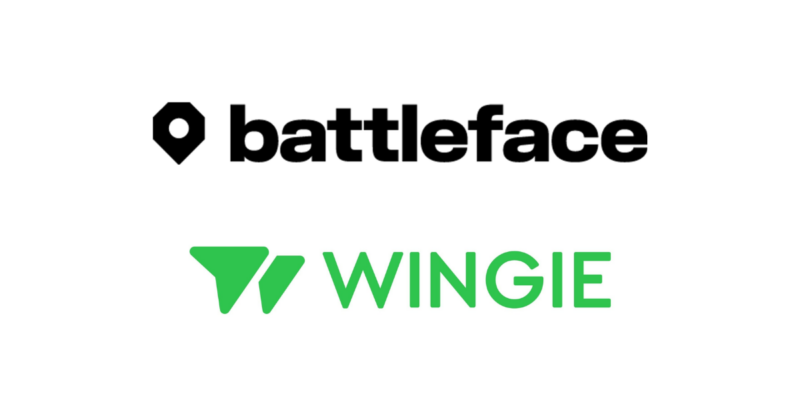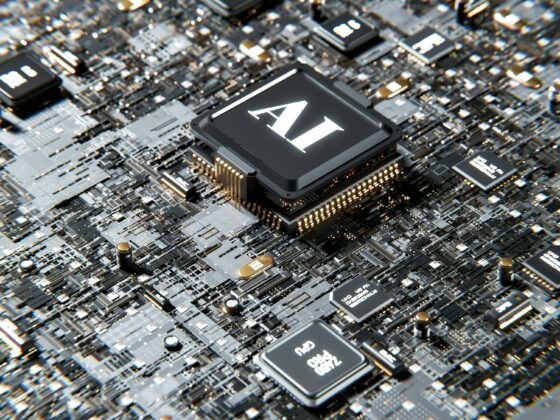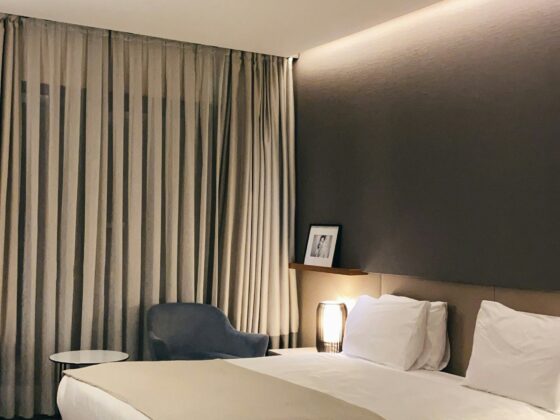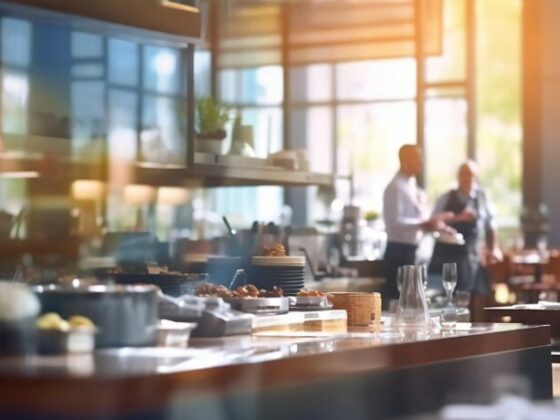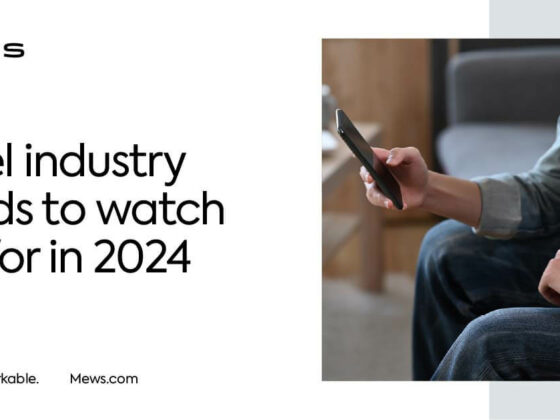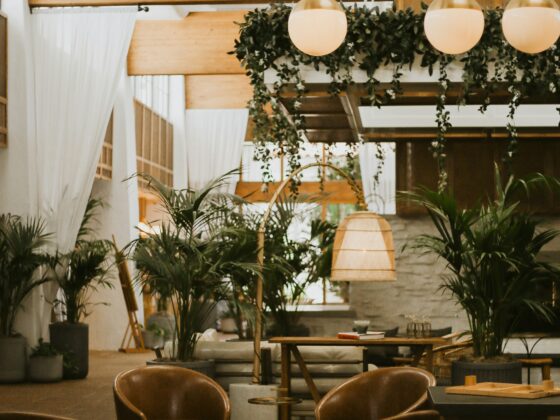There are dozens of touchpoints throughout the guest journey that have the opportunity to be made contactless. From checking in online to ordering room service off a mobile app or messaging housekeeping to request extra towels.
With the right technology, these contactless experiences can not only enhance guest satisfaction, making it easier for travelers to get what they need, but also streamline internal workflows, making day-to-day hotel operations effortless for teams.
In this article, we explore the role of integrated technology in the hotel industry and how it’s empowering hoteliers to deliver contactless guest experiences.
What is a contactless guest experience?
A contactless guest experience empowers your guests to complete parts of their stay without physical interaction. While it’s possible for hotels today to deliver completely contactless guest experiences, eliminating physical interaction from booking to check-out, many hotels opt for a hybrid model, with some in-person interactions paired with contactless options.
For example, hotels can have guests sign the necessary paperwork, provide ID and booking confirmation, and receive a digital key, all prior to ever stepping foot on your property. This approach not only builds trust as part of a great customer experience but frees up valuable time for your staff to focus on other tasks.
The evolution of contactless experiences
Contactless technologies experienced a surge in popularity during the COVID-19 pandemic, given limited physical contact and social distancing.
Hoteliers discovered contactless options not only helped during labor shortages but also exceeded guest expectations, with travelers expressing a desire for continued use of contactless experiences. In a 2022 Statista survey conducted post-pandemic, 50% of respondents reported the desire for permanent adoption of contactless check-in and check-out, along with contactless hotel payment methods, like Apple Pay and buy now, pay later (BNPL) options such as Affirm.
Hotels listened, and today, it’s commonplace for guests to run into contactless touchpoints throughout the guest journey (and almost surprising when they’re not available).
Looking ahead, hoteliers can expect increased use cases for artificial intelligence (AI) as part of the shift towards contactless hospitality, including:
- Facial recognition for ID verification
- Intelligent chatbots
- Personalized recommendations (dining, activities, services)
- Predictive maintenance and housekeeping
- Real-time resolution (ie., detect if a digital key is not working)
AI will support hotels in delivering hyper-personalized services at scale, to enhance the guest experience and streamline operations.
How to implement contactless touchpoints throughout the guest journey
The contactless hotel journey enhances convenience while personalizing your guests’ experience. From discovery to post-stay, each stage offers unique opportunities to streamline interactions with your guests.
This section covers key tools and best practices for enabling contactless solutions for a winning hotel guest experience. By adopting these strategies, hotels can meet guest expectations and improve operational efficiency.
Discovery
Guests expect to be able to book a hotel stay without having to pick up the phone. To keep travelers on your site and away from OTAs, hotels must seamlessly integrate their booking engine to facilitate online bookings. Ensure your booking engine is user-friendly, mobile-responsive, and offers efficient search functionalities so guests can search its interfaces and book without interaction with your property.
Include add-ons and upsells on your property’s website to increase revenue and allow guests to customize their stay with you. A few other technologies that facilitate contactless experiences during the discovery phase include:
Chatbots
Sometimes, travelers need help or answers to questions but are unsure of the best way to contact you. That’s where chatbots can become an integral part of your hotel website. A hotel chatbot is often powered by AI, mimicking human conversations between your property and guests to answer questions and facilitate a seamless booking experience.
Research shows that chatbots can increase booking conversion rates for hotels by up to 30% and lead to a 55% increase in upselling opportunities for hotels.
Online payments
Most travelers are comfortable making online payments, and for hotels, it’s a win-win. Not only are you collecting payment details ahead of time in case of cancellations or no-shows, but you can store guest payment details in the PMS so that when guests make a purchase on-property, it will be automatically charged to their folio, improving the guest experience.
Pre-arrival
During the pre-arrival phase, you’ll want to build anticipation and answer questions, ideally before guests have to get in touch with you. Place importance on using effective technology solutions to enhance your contactless service with guests throughout this period.
Immediate confirmation
The last thing your guests want to feel when they book with you is stress or anxiety. Keep your processes running smoothly and alleviate your guests’ worries with a confirmation email immediately after booking.
As a best practice, collect guests’ preferred contact methods during the booking process (like email, SMS, or WhatsApp) and follow up with all communication via this channel.
After you send the initial confirmation message with reservation details, build out additional flows to send at regular intervals leading up to arrival. We recommend a week or so before with FAQs and upsell opportunities and the day before with check-in instructions.
Upsell promotion
During your pre-arrival touchpoint, suggest activities and upsells for your guests to book prior to their stay. These can be tailored to your guests’ preferences based on the information stored in their guest profiles. For example, a bottle of champagne in their room upon arrival is a thoughtful touch for a couple celebrating their honeymoon.
Be strategic when offering add-ons and extra services, and ensure your packages suit your target audience. Leveraging existing guest data within your customer relationship management (CRM) system, will help to present, rather than push, your upsell products and services.
Digital check-in
Prior to arrival, send a link to your guests where they can fill in their information, including verifying their ID, payment methods, and guest information. Digital check-in is also a good time to present possible guest room upgrades to guests who might wish for a little extra space.
Prior to their immediate arrival, send your guests a digital welcome kit with information on where to park, your Wi-Fi password, amenities, and local tips. This will streamline their check-in experience even further, allowing them to breeze past your property’s reception upon arrival.
During Passport 2024, Ricardo Diaz, Strategic Onboarding Consultant at Cloudbeds, showcased how Cloudbeds facilitates digital check-in and upselling for hotels.
Watch the full session from Passport 2024.
Arrival
During the arrival phase, if you offer contactless check-in, try to find other unique ways to welcome guests in person and provide them with a human touch, like a welcome drink, local custom, or personalized note.
Digital keys
Consider leveraging digital keys to help guests bypass the front desk completely. Once guests complete digital check-in, you can release the room key for them to use upon arrival.
Not only do keyless check-ins remove the need for a physical keycard, but they also reduce associated costs with producing keys and ensure guests always have access to their room via their mobile devices.
In Cloudbeds, for example, hotels can choose from one of our digital key partners and enable the functionality within the system. Hotels can set check-in and check-out times indicating when the key is valid, and guests can then access the key in the Guest Book (a mobile link) at the set time.
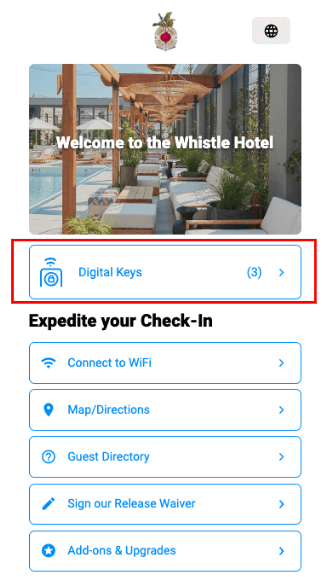
Self-service kiosks
Another option for check-in is kiosks. Enable guests to check themselves in and out by placing self-service kiosks in your lobby. These terminals automate manual tasks and workflows like dispensing hotel keys, booking concierge services, and even making reservations, cutting down on guest interactions and foot traffic to your front desk and satisfying guest needs.
In-stay
Guests shouldn’t have to pick up the phone or come down to the front desk when they need something. Make it easy for them to order room service, request housekeeping services, ask questions, and book activities.
Messaging platforms
Guest messaging platforms not only save your guests time when they have a quick question, but they also satisfy guest expectations by aligning with their preferred messaging channel.
Through a unified inbox, you and your hotel staff can quickly address questions from across different platforms, such as SMS, WhatsApp, and even OTAs like Airbnb. For more efficient communication, use pre-programmed chat tools to minimize human intervention and reduce repetitive questions.
Digital room service
Allow your guests to order room service from their mobile devices using an app or messaging channel. Toast, for example, makes it easy for guests to order via QR code and have the charge added to their folio – this self-serve experience results in a 9% higher check size compared to traditional methods.
Contactless check-out (& applicable upsells)
Prior to checkout, follow up with guests via messaging channel to see if they’d be interested in a late checkout (if available) or transportation to their next destination as part of your upselling strategy. Using the guest book, they should be able to choose and pay for these selections.
Post-stay
Just because your guests have departed your hotel doesn’t mean the contactless experience stops there.
Digital invoices
Ensure your guests always have access to their payment records and confirmations by providing digital copies of invoices and receipts via email. This reduces paper waste associated with billing while enabling a digital paper trail to keep track of finances.
Automated feedback
Make it easy for your visitors to leave feedback about your property by automating this process. Use automated messaging to send guests post-stay surveys to collect their thoughts and opinions X number of hours or days after their stay.
You can also build review workflows to collect feedback on platforms like Google and TripAdvisor.
How integrated technology makes it possible
Integrated technology paves the way for efficient, contactless guest experiences that meet evolving traveler demands. With the property management system (PMS) at its core, hotels are able to integrate hospitality technology that makes it easy to deliver contactless experiences.
Sweet Accommodations implements contactless experiences
Starting out as one small hostel in the middle of Barcelona, Sweet Accommodations has grown into a diverse portfolio of unique hotels, hostels, suites, studios, co-living spaces, and apartments across Barcelona, Sevilla, and Lloret de Mar — catering to a wide range of guests, from families and friends to digital nomads and business travelers.
With Cloudbeds, Chekin, and HiJiffy, Sweet Accommodations has been able to automate guest registration, implement online check-in, and offer AI-powered guest communication from booking to departure to facilitate contactless guest experiences.
Since switching to Cloudbeds, Sweet Accomodations’ upsells and repeat customers have increased by 20%, and they’ve been able to dedicate an additional 16 hours per week to elevating guest experiences – from personalized welcomes to unique excursions.
Delivering unique, contactless experiences
With Cloudbeds and our marketplace partners, hoteliers can offer contactless payment methods, guest messaging, an integrated booking engine, automated workflows, digital keys, surveys, invoicing, and more to build a unique and customizable guest experience.
Deliver contactless guest experiences with Cloudbeds.

